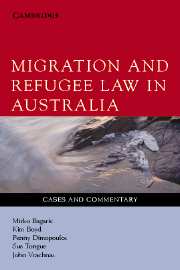Book contents
- Frontmatter
- Contents
- Detailed table of contents
- Table of cases
- Table of statutes
- 1 Thinking about migration law and national borders: An aspirational benchmark?
- 2 Introduction to Australian immigration law
- 3 Family and interdependency visas
- 4 Business and investment and skill-based visas
- 5 Temporary visas
- 6 Miscellaneous visas
- 7 Common visa requirements
- 8 Introduction to Australian refugee law: The Refugees Convention in Australian domestic law
- 9 Convention grounds
- 10 Persecution
- 11 Well-founded fear of persecution
- 12 Limits on protection of refugees: Cessation, exclusion exceptions and protection by another country
- 13 Cancellation of visas
- 14 Judicial review
- 15 Migration and human rights
- Index
13 - Cancellation of visas
Published online by Cambridge University Press: 05 June 2012
- Frontmatter
- Contents
- Detailed table of contents
- Table of cases
- Table of statutes
- 1 Thinking about migration law and national borders: An aspirational benchmark?
- 2 Introduction to Australian immigration law
- 3 Family and interdependency visas
- 4 Business and investment and skill-based visas
- 5 Temporary visas
- 6 Miscellaneous visas
- 7 Common visa requirements
- 8 Introduction to Australian refugee law: The Refugees Convention in Australian domestic law
- 9 Convention grounds
- 10 Persecution
- 11 Well-founded fear of persecution
- 12 Limits on protection of refugees: Cessation, exclusion exceptions and protection by another country
- 13 Cancellation of visas
- 14 Judicial review
- 15 Migration and human rights
- Index
Summary
Overview of cancellation grounds
Visas, once granted, are never final, and the government retains the right to cancel them.
There are a number of grounds upon which a visa can be cancelled. Most commonly, a visa is cancelled where a condition is breached or a condition or other requirement is not satisfied. The effect of cancellation is that the person becomes an unlawful non-citizen. The power to cancel visas is normally discretionary and normally subject to review by the Migration Review Tribunal, unless the cancellation is made by the minister personally or on character grounds. The effects of cancellation are discussed in chapter 11 of the textbook, Migration and Refugee Law: Principles and Practice in Australia.
As noted in section 11.2 of the textbook, there are a number of grounds (nine in total) upon which visas can be cancelled. The grounds are:
cancellation because of inaccurate information (s 109)
the general cancellation power where visa conditions are not complied with (s 116)
cancellation without notice for off-shore visa holders on the basis of s 116 ground (s 128)
cancellation of business visas (s 134)
automatic cancellation of student visas (s 137J)
cancellation of regional sponsored employment visas (s 137Q)
cancellation of related visas where primary visa is cancelled (s 140)
cancellation of Temporary Safe Haven visas (s 500A)
cancellation of visas on character grounds (s 501).
These powers operate cumulatively. Thus, a visa can be cancelled under more than one of the powers (s 118).
- Type
- Chapter
- Information
- Migration and Refugee Law in AustraliaCases and Commentary, pp. 387 - 406Publisher: Cambridge University PressPrint publication year: 2006



